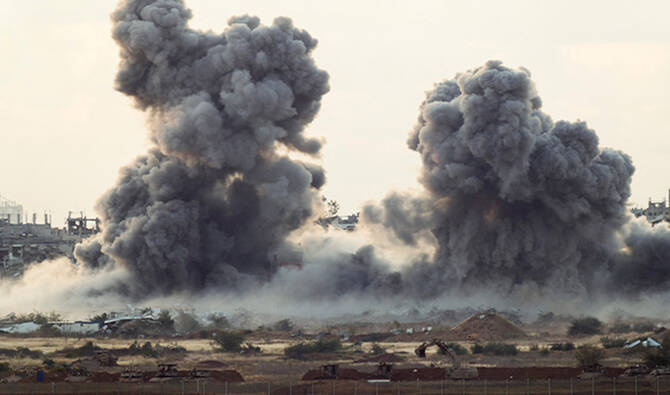ISLAMABAD: Pakistan on Tuesday condemned the bombing of the Baptist Hospital in Gaza by Israeli forces on Palm Sunday, calling it part of a pattern of targeting medical facilities, which constituted a “flagrant violation” of international humanitarian law.
The Israeli military said in a statement it had taken steps to reduce harm to civilians before it struck the compound, which it said was being used by Hamas fighters to plan attacks. Hamas rejected the accusation and called for an international investigation. Health officials at the Al-Ahli Arab Hospital evacuated patients after a phone call from someone who identified himself as Israeli security shortly before the attack.
The hospital - an institution run by the Anglican Church in Jerusalem - was no longer operational, according to Gaza's health ministry. No casualties were reported in the strike.
“That it occurred on Palm Sunday, a sacred occasion for Christians, underscores Israel’s blatant disregard for religious sanctity and civilian lives,” the Pakistani foreign office said.
“Israel’s relentless assaults have crippled Gaza’s healthcare system, depriving critically ill patients of vital medical care. Coupled with the blockade on humanitarian aid, these actions reflect a deliberate strategy to prolong suffering and entrench conflict.”
Pakistan demanded an immediate end to Israel’s “ongoing atrocities,” saying they had resulted in the indiscriminate killing of innocent and unarmed Palestinians, including women and children, and the “systematic destruction” of civilian infrastructure.
“Pakistan calls for an immediate halt to the hostilities by Israeli occupying forces and reiterates its support for the two-State solution, with a viable, independent and sovereign State of Palestine on pre-June 1967 borders with Al Quds Al Sharif as its capital,” the statement added.
“Pakistan urges the international community to take decisive action to hold Israel accountable and protect Palestinian civilians from further violence.”
Sunday's strikes came as Hamas leaders began a fresh round of talks in Cairo in a bid to salvage a stalled ceasefire agreement with Israel, as Egypt, Qatar, and the United States attempted to bridge gaps between the sides.
Media footage widely showed significant destruction in and outside the hospital compound's church, and patients who could not leave.
The Episcopal Church in Jerusalem said the warning to evacuate the hospital came 20 minutes before the strike that destroyed the two-storey genetic laboratory, and damaged the pharmacy and emergency department buildings and other surrounding structures.
"We call upon all governments and people of goodwill to intervene to stop all kinds of attacks on medical and humanitarian institutions," the church said in a statement.
The Palestinian foreign ministry and Hamas condemned the attack, saying Israel was destroying Gaza's healthcare system. Israel says Hamas systematically exploits civilian structures, including hospitals, which the group denies. Israeli forces have carried out numerous raids on medical facilities in Gaza.
With inputs from Reuters


















